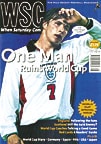 Business as usual for Scotland in the World Cup, but not for their fans. As a shellshocked Archie MacGregor reports, some found themselves backing England
Business as usual for Scotland in the World Cup, but not for their fans. As a shellshocked Archie MacGregor reports, some found themselves backing England
As if anyone needed reminding, Scotland made their customary ignominious exit from the World Cup in St Etienne on June 23rd. This should not, however, be confused with the end of the Scottish nation’s World Cup campaign, which was only formally completed a full seven days later in the same city. Only with confirmation that England too would be hopping it back across the Channel could the average football-supporting Scot accept that this Coupe de Monde business was done and dusted.
The overwhelming sense of Schadenfreude does, of course, conform almost perfectly with the stereotypical notion of the Scots as a bunch of mean-spirited and unsporting rogues as is commonly, and it seems increasingly, subscribed to by those living south of Gretna. But what’s new? Was Scotland transformed into a homogeneous mass of blubbering wrecks when the USA trounced England 1-0 in Belo Horizonte in 1950? Is Denis Law the only living Scot who regards July 30th 1966 as the worst day of his life? I suspect not.
Remarkably, however, the issue of the age-old anti-England knee jerk managed to become the subject of a genuine, and sometimes vigorous, debate in the Scottish media during France 98. Noticeably, too, the arguments did not always follow predictable battlelines.The Scotsman’s Lawrence Donegan led the way in the bid to reconstruct the national psyche by declaring his intention to lend support to England. But it was a novelty approaching that of a Scotland goal from open play to pick up a copy of the Daily Record on June 15th and come across an article headed Let’s not cheer too loudly if England lose – why the Tartan Army should grow up and stop putting the boot into the old enemy. Admittedly the author, Ian Bell, was of broadsheet stock, but considering that the vicious circulation war between the Record and the Scottish Sun largely revolves around a pathetic charade of appearing ‘more Scottish than thou’ such a plea for clear-headed rationality was startling.
Not to be outdone the Sun’s Rikki Brown weighed in after England’s exit with a searing rebuke for the Argentinians’ instantly acquired Caledonian supporters club branch: “Any Scot who supported the Argentinians should be ashamed of themselves… what happened to our claim to be the friendliest nation on Earth?”
The Edinburgh Evening News joined in the spirit of detente before the Argentina game, issuing a good luck message to Hod and the lads, while even in the phone-in columns, normally a repository for society’s more deeply-held prejudices, there were some spirited rebuttals of the widespread delight at England’s demise. “I just don’t understand why so many people hate England – it’s just another form of sectarianism,” said a caller to the Daily Record’s sports hotline on July 3rd.
The stirrings of a new age of enlightenment? Well not quite. The vast majority of the writings on the E-word in the Scottish press were still characterized by undercurrents of gloating or a patent inferiority complex. On the same day as the Daily Record carried an innovative feature on the experiences of an English staff reporter who went around Glasgow city centre with her face painted in the St George’s Cross and wearing the three lions top, the paper’s front page story hailed England out… just what we really, really wanted. Earlier, the Sun issued a typically considered dismissal of the Scots-born England assistant manager’s plea for cross-border support for Hoddle’s team by branding him “John Gormless”. The Scottish Sunday Times’ Allan Brown confessed he wouldn’t support England “even if they played Mass Murderers United”.
Was the exchange merely chattering-class fodder or symptomatic of a real willingness to reappraise an enduring antipathy? The overwhelming “Yes” vote in the devolution referendum and subsequent opinion poll support for independence have provoked discussion on the question of forging a Scottish identity based on something more positive than simply not being English. For the most part, however, such reflections are still the preserve of the wine bars and university common rooms – down in the streets or in the cantilever stands next season you’d be hard pressed to find many who weren’t anything other than gleeful about England’s defeats.
Culture, politics, history, you can round up all the usual suspects, but don’t overlook the more football- specific living-in-the-shadow-of-a-powerful-neighbour syndrome. Just as most Man City fans would lend moral support to each and every one of Man Utd’s Champions League opponents, so the Scots will look to anyone, anywhere to knock the Auld Enemy off their perch.
And then there’s the most formidable barrier of all to greater peace, love and understanding – Messrs Hill, Motson, Moore, Lynam etc, whose unfailing presumptuousness about England’s likely progress does more to raise the hackles of the average Scot than any number of SNP political broadcasts piped into our living rooms. Only when the whistle is blown on this hyperbole will the fine words of the opinion writers stand any chance of being turned into the deeds of the Tartan Army.
From WSC 138 August 1998. What was happening this month